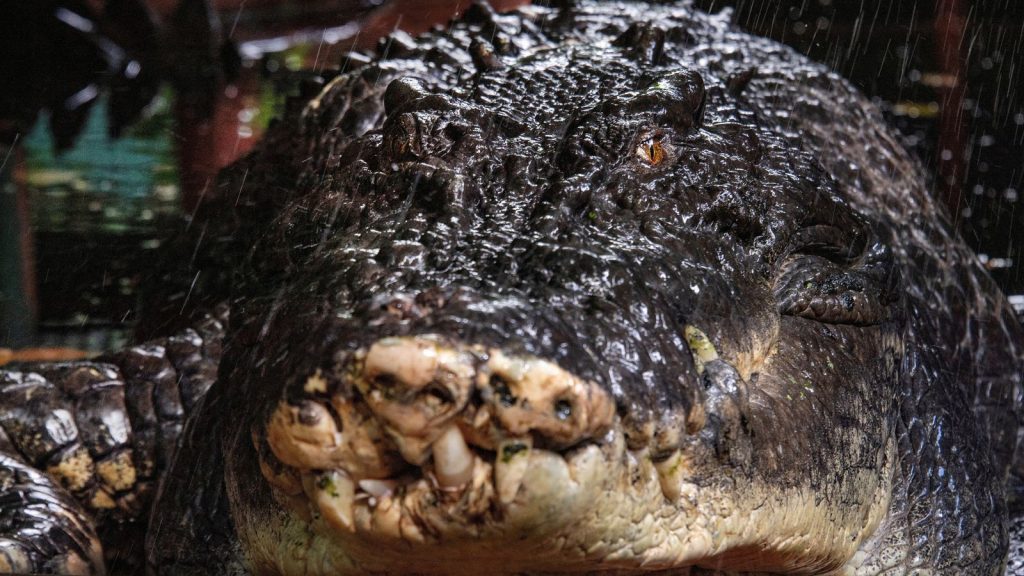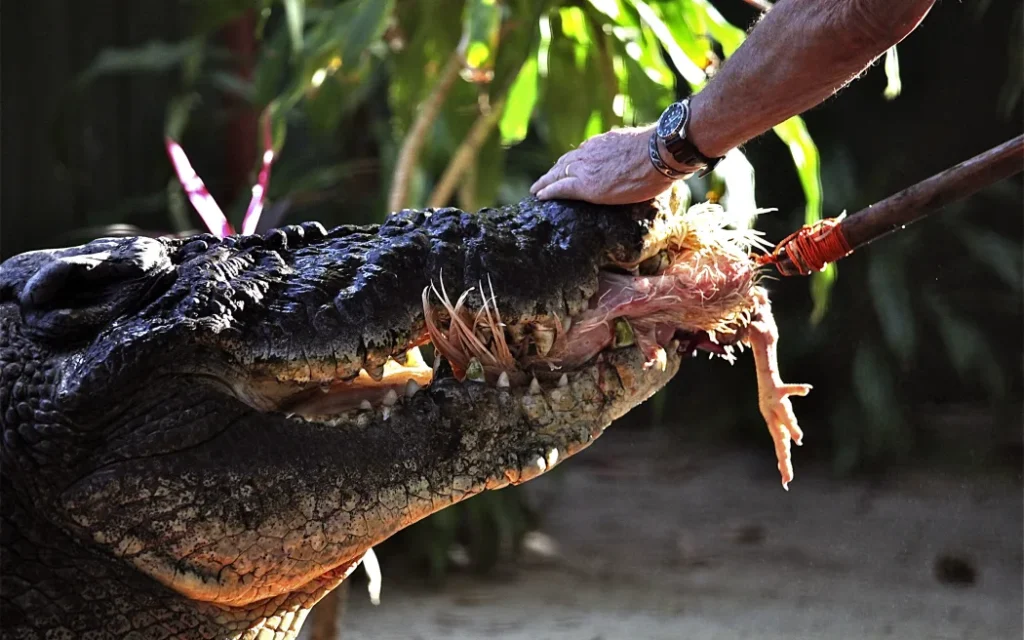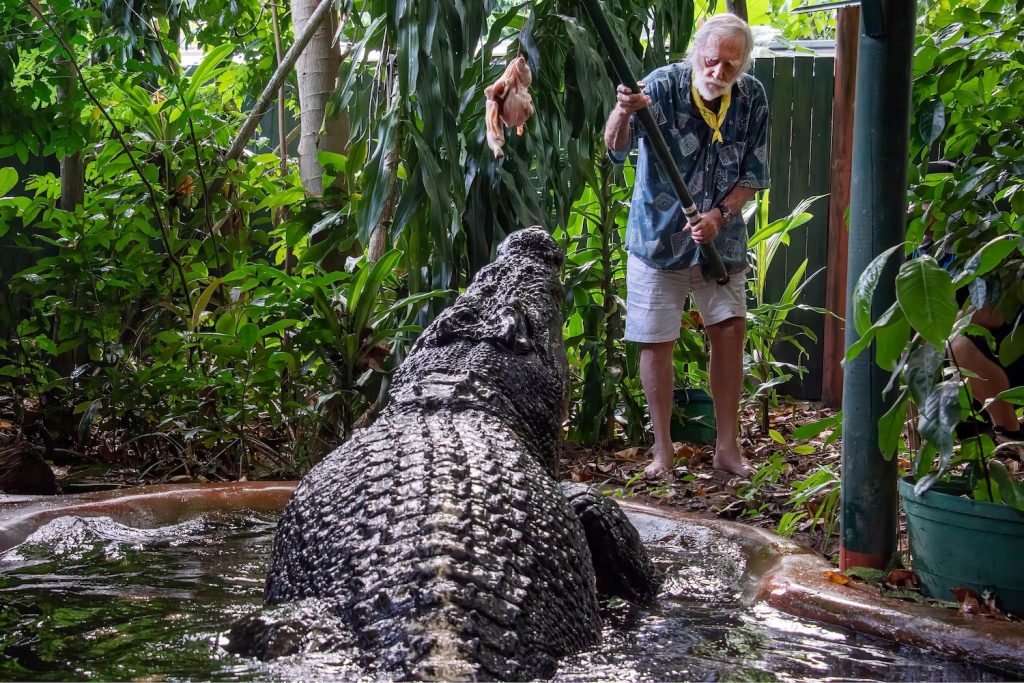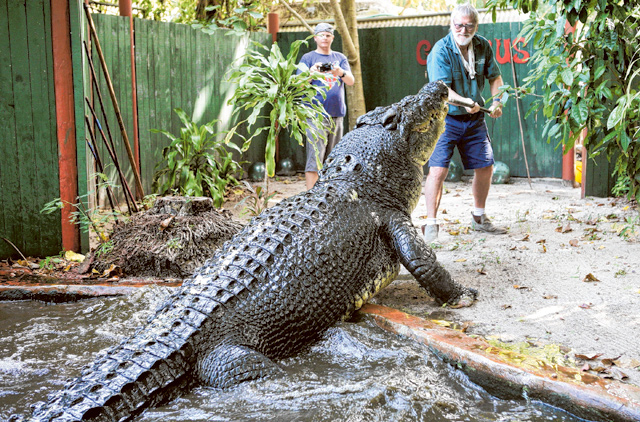The Legacy of Cassius: The World’s Largest Captive Crocodile Passes Away at Over 110 Years Old.
In a heartfelt announcement that has reverberated through the wildlife community, Cassius, the world’s largest crocodile in captivity, has died at the impressive age of over 110 years. The crocodile, measuring an astonishing 5.48 meters (18 feet) and weighing more than a ton, passed away at Marineland Melanesia, a crocodile habitat located on Green Island near Cairns, Queensland. His death marks the end of an era for the sanctuary and for those who admired this magnificent reptile.
Cassius, a saltwater crocodile, was recognized by the Guinness World Records as the largest crocodile in captivity following the death of his predecessor, Lolong, in 2013. The sanctuary reported that Cassius had been in declining health since mid-October, prompting the staff to monitor him closely in his final days. On social media, the sanctuary expressed their sorrow, stating, “He was very old and believed to be living beyond the years of a wild croc. Cassius will be deeply missed, but our love and memories of him will remain in our hearts forever.”
Having resided at Marineland Melanesia since 1987, Cassius had a long and storied life, originating from the Northern Territory, where crocodiles are an integral part of the ecosystem and tourism. His remarkable size and age drew countless visitors, making him not only a symbol of the sanctuary but also a representation of the importance of crocodile conservation efforts.

Crocodiles play a critical role in maintaining the health of their ecosystems. As apex predators, they help control the populations of various species, thus ensuring a balanced food web. Their presence is crucial for the preservation of wetlands and river ecosystems, where they often create habitats that benefit other wildlife. Despite their ecological significance, crocodiles face numerous threats, including habitat loss, hunting, and climate change.
The passing of Cassius brings attention to the pressing need for conservation initiatives aimed at protecting crocodile populations in the wild. With global crocodile populations facing various challenges, sanctuaries like Marineland Melanesia play a vital role in educating the public about the importance of these reptiles and the ecosystems they inhabit.
Cassius was not just a resident of Marineland Melanesia; he was a major attraction that contributed significantly to wildlife tourism in the region. His impressive size and age made him a focal point for visitors from around the world, helping to raise awareness about crocodiles and the challenges they face. Wildlife tourism provides crucial funding for conservation efforts, and the loss of such a prominent figure could impact the sanctuary’s ability to attract visitors in the future.
Tourism based on wildlife observation encourages people to appreciate and respect these creatures, fostering a connection between humans and nature. Cassius served as an ambassador for his species, promoting understanding and empathy towards crocodiles. His life story has inspired countless individuals to learn more about these ancient reptiles and the importance of preserving their habitats.

During his time at Marineland Melanesia, Cassius received dedicated care from a team of wildlife experts who ensured he lived a comfortable life. His diet, habitat, and health were closely monitored, allowing him to thrive in a controlled environment that mimicked his natural habitat as closely as possible. The sanctuary staff provided him with veterinary care, enrichment activities, and a well-maintained living space that allowed him to display natural behaviors.
Caring for such a large reptile presents unique challenges, especially as crocodiles age. Cassius’s declining health in recent months highlighted the complexities of managing the care of an elderly crocodile. His team had to adapt to his changing needs, making modifications to his environment and routine to accommodate his health issues. This commitment to his well-being reflects the dedication of the staff at Marineland Melanesia to provide the highest quality of life for the animals in their care.
With Cassius’s passing, Marineland Melanesia is committed to continuing its conservation and education initiatives. The sanctuary aims to honor Cassius’s legacy by focusing on programs that educate the public about crocodiles, their habitats, and the threats they face. This includes interactive exhibits, guided tours, and workshops that engage visitors and encourage a deeper understanding of crocodile ecology.
One of the primary goals of such initiatives is to promote the conservation of crocodile populations in the wild. By educating the public about the ecological importance of crocodiles, the sanctuary hopes to inspire individuals to take action in their communities. Conservation efforts are essential for protecting these reptiles and their habitats, ensuring that future generations can appreciate the beauty and significance of crocodiles in the wild.
The news of Cassius’s death has prompted an outpouring of grief and tributes from fans and conservationists alike. Many people who visited the sanctuary over the years have shared their memories of meeting Cassius, highlighting the impact he had on their lives. Social media platforms have been flooded with messages of condolences, showcasing the profound connection that individuals felt with this remarkable crocodile.
For many, Cassius was more than just a record-breaking reptile; he was a symbol of resilience and survival in the face of adversity. His story resonated with people around the world, reminding them of the importance of wildlife conservation and the need to protect the natural world.
While the loss of Cassius is undoubtedly a significant blow to Marineland Melanesia, the sanctuary remains focused on its mission of conservation and education. Staff members are determined to carry on Cassius’s legacy, ensuring that his memory lives on through the work they do. The sanctuary will continue to promote awareness about crocodiles and their habitats, working to inspire others to take action in support of wildlife conservation.

As they navigate this challenging time, the team at Marineland Melanesia is committed to honoring Cassius by fostering a deeper understanding of the ecological role of crocodiles and advocating for their protection. They hope that through their efforts, the story of Cassius will continue to inspire future generations to appreciate and conserve the incredible diversity of wildlife that inhabits our planet.
The death of Cassius, the world’s largest captive crocodile, marks the end of an era but also serves as a rallying call for crocodile conservation. His remarkable life and legacy will be remembered not just for his size but for the impact he had on those who visited him. As we reflect on Cassius’s contributions to wildlife education and tourism, we are reminded of the urgent need to protect crocodiles and their habitats for the future.
Crocodiles, as ancient creatures, have witnessed significant changes in their environment over millions of years. Their survival depends on our commitment to preserving their habitats and ensuring they can thrive in the wild. In honoring Cassius, we reaffirm our dedication to these efforts, recognizing that every crocodile plays a vital role in the ecosystem and deserves our respect and protection.




